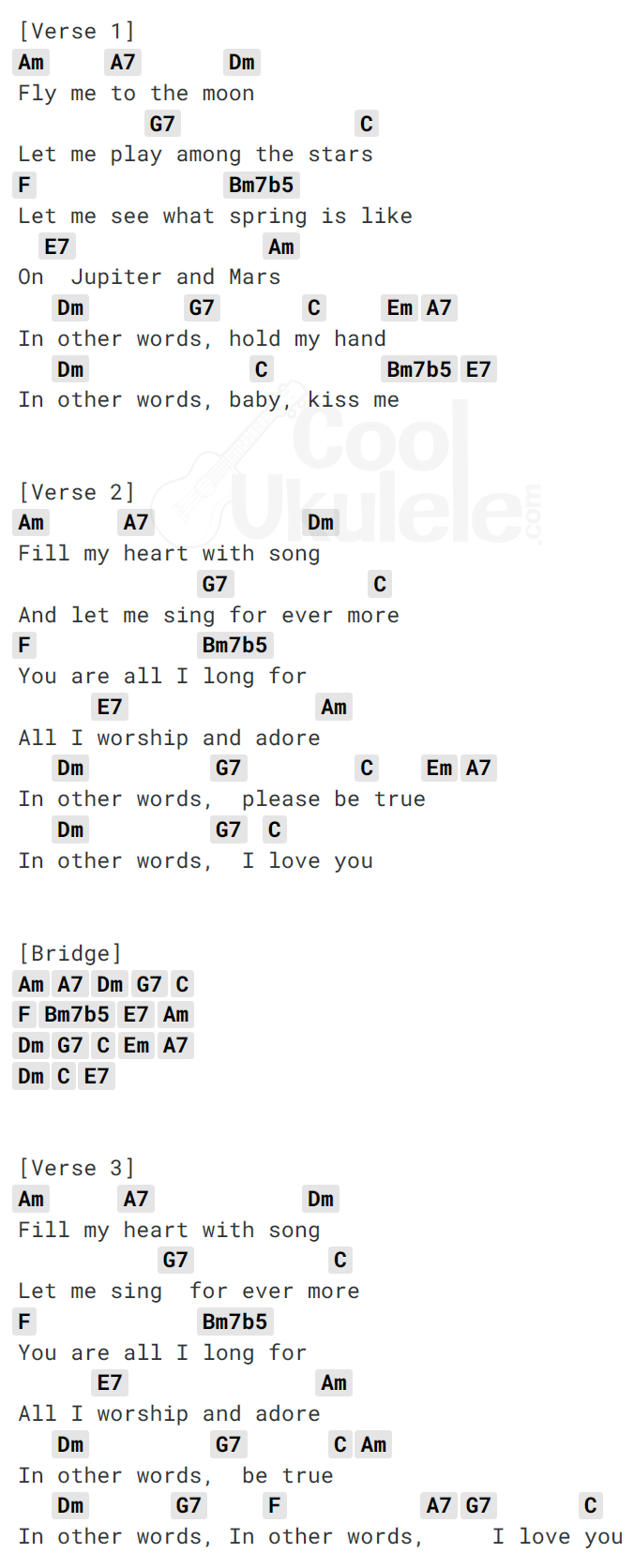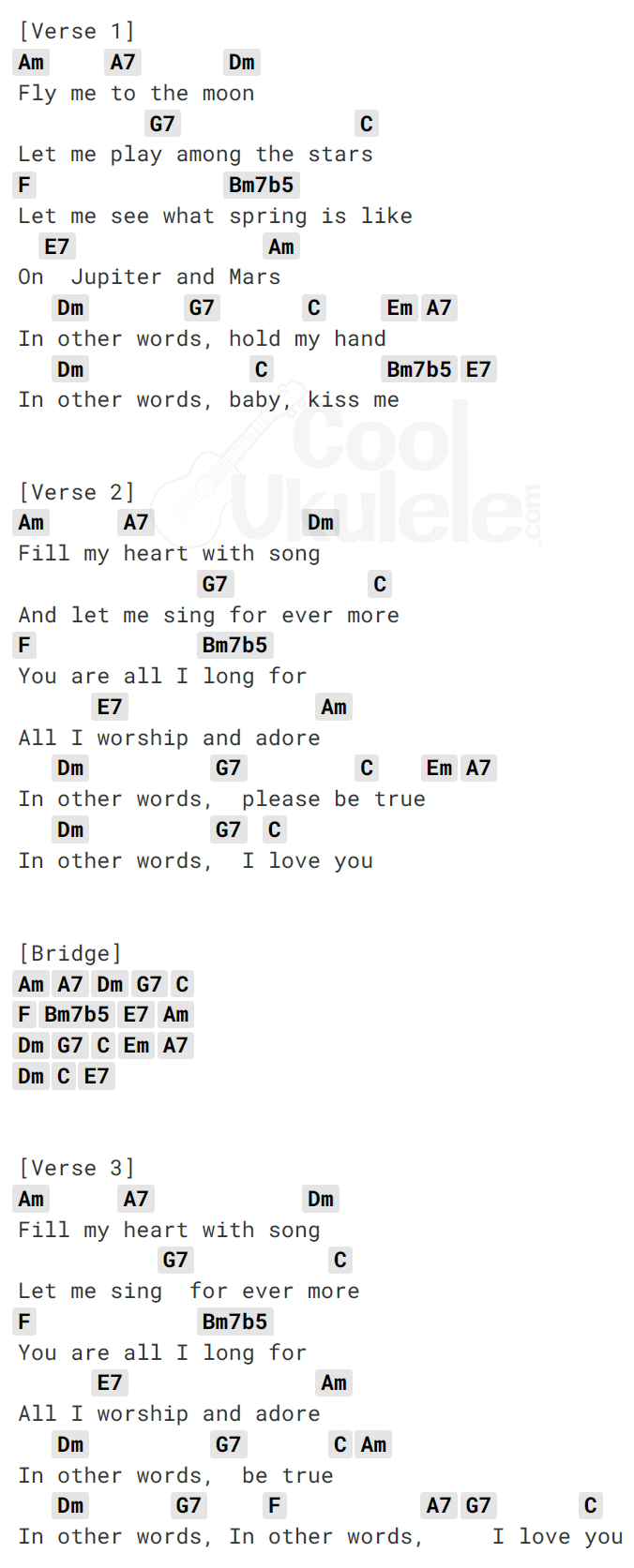
“Fly Me to the Moon” is a popular song written by Bart Howard in 1954.
Originally titled “In Other Words,” the song was inspired by the emerging space race and the possibility of space travel.
Howard was a songwriter in New York City’s Tin Pan Alley, and he wrote the song for his publisher, who suggested the title change.
The first recorded version of the song was performed by Felicia Sanders in 1959.
However, the most well-known version is probably the one performed by Frank Sinatra, which was released on his 1964 album “It Might as Well Be Swing.”
Sinatra’s version of the song became one of his signature tunes and has been used in numerous films and television shows.
Official Music Video
Here’s an official video version of the song to play/sing along to on your uke!
DGBE Baritone Ukulele Version (Key of C)


Brief Song History
“Fly Me to the Moon” is a popular song written by Bart Howard in 1954.
The song was originally titled “In Other Words” and was first introduced in cabaret performances by Felicia Sanders in 1954.
The song was later recorded by a number of artists, including Peggy Lee, Tony Bennett, and Frank Sinatra, who recorded the most famous version of the song in 1964.
Sinatra’s version of the song was included on his album “It Might as Well Be Swing” and became one of his signature songs.

The song’s title was officially changed to “Fly Me to the Moon” when it was recorded by Kaye Ballard in 1959.
The song’s popularity continued to grow throughout the 1960s and beyond, and it has since been covered by many other artists.
In addition to its popularity as a song, “Fly Me to the Moon” has also been played as background music during several historic events, including the Apollo 10 mission in 1969, which played the song during its lunar orbit.
The song has since been associated with space exploration and has become an unofficial anthem for astronauts and space enthusiasts alike.
ADF#B Ukulele Tuning Version

[Verse 1]
Am A7 Dm
Fly me to the moon
G7 C
Let me play among the stars
F Bm7b5
Let me see what spring is like
E7 Am
On Jupiter and Mars
Dm G7 C Em A7
In other words, hold my hand
Dm C Bm7b5 E7
In other words, baby, kiss me
[Verse 2]
Am A7 Dm
Fill my heart with song
G7 C
And let me sing for ever more
F Bm7b5
You are all I long for
E7 Am
All I worship and adore
Dm G7 C Em A7
In other words, please be true
Dm G7 C
In other words, I love you
[Bridge]
Am A7 Dm G7 C
F Bm7b5 E7 Am
Dm G7 C Em A7
Dm C E7
[Verse 3]
Am A7 Dm
Fill my heart with song
G7 C
Let me sing for ever more
F Bm7b5
You are all I long for
E7 Am
All I worship and adore
Dm G7 C Am
In other words, be true
Dm G7 F A7 G7 C
In other words, In other words, I love you
Frank Sinatra Biography
Frank Sinatra was an American singer, actor, and producer, widely regarded as one of the most popular and influential musical artists of the 20th century.
He was born on December 12, 1915, in Hoboken, New Jersey, and died on May 14, 1998, in Los Angeles, California.
Sinatra began his career as a singer in the 1930s, performing with various bands, including the Tommy Dorsey Orchestra. He became a solo artist in the 1940s and quickly rose to fame with his smooth vocals and charisma.
Some of his most famous songs include “My Way,” “Fly Me to the Moon,” and “New York, New York.”

Sinatra also had a successful career in acting, appearing in over 50 films throughout his career, including “From Here to Eternity,” for which he won an Academy Award for Best Supporting Actor.
In addition to his music and acting, Sinatra was known for his involvement in politics and social causes.
He was a vocal supporter of civil rights and was known to have close relationships with political figures, including John F. Kennedy.
Throughout his career, Sinatra sold over 150 million records worldwide and won numerous awards, including 11 Grammy Awards.
He was inducted into the Rock and Roll Hall of Fame in 1990 and posthumously awarded the Presidential Medal of Freedom in 1985.
Sinatra’s influence on popular music and culture continues to be felt today, with many contemporary artists citing him as an inspiration.
Regenerate response
Left-Hand GCEA Tuning Version


“Fly Me to the Moon” Song Facts
“Fly Me to the Moon” is a classic jazz standard written by Bart Howard in 1954. Here are some interesting facts about the song:
- Originally titled “In Other Words”, the song was first introduced by Felicia Sanders at a cabaret show in New York City in 1954.
- The song’s popularized title, “Fly Me to the Moon,” came about after Frank Sinatra recorded a version of the song in 1964. This version became one of Sinatra’s signature songs.
- “Fly Me to the Moon” was played on the Apollo 10 mission in 1969, which was a dress rehearsal for the Apollo 11 mission that landed on the moon. Astronaut Gene Cernan later said, “We played ‘Fly Me to the Moon’ on our way to the moon, and I think Frank Sinatra would have been proud.”
- The song has been covered by numerous artists over the years, including Tony Bennett, Diana Krall, and Michael Bublé.
- The song’s lyrics contain many allusions to space travel and the moon, such as “Fill my heart with song and let me sing forevermore/You are all I long for, all I worship and adore” and “Let me see what spring is like on Jupiter and Mars.”
- In 1999, the Songwriters Hall of Fame recognized “Fly Me to the Moon” as one of the most-performed songs of the 20th century.
- The song has been featured in several movies, TV shows, and commercials, including the 1991 film “Once Around,” the 2003 film “Down with Love,” and the 2019 TV series “The Umbrella Academy.”
Overall, “Fly Me to the Moon” is a timeless classic that continues to be beloved by music lovers around the world.
